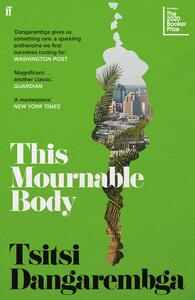Take a photo of a barcode or cover
dark
emotional
reflective
slow-paced
Plot or Character Driven:
Character
Strong character development:
Yes
Loveable characters:
No
Diverse cast of characters:
Yes
challenging
dark
mysterious
tense
slow-paced
Plot or Character Driven:
A mix
Strong character development:
Complicated
Loveable characters:
Complicated
Diverse cast of characters:
No
Flaws of characters a main focus:
Yes
I really had enjoyed Dangarembga's previous book and looked forward to this.
From a world history perspective it has a little history to share - the struggle, the moves to expropriate land from white owners, etc.
But the story leaves a lot unclear (if they haven't read the first book) as to why folks were fighting, why land is being expropriated, etc.
From a readability perspective, keep in mind that I am reading this in the pandemic where I look to books to escape all the stuff going on, this is a bit of a downer.
There are a lot of issues the narrator has to face and it is a hard read - injustice, abuse, mental instability, etc. At the same time, the narrator is not without her own sins and that is also hard to read.
You also feel that "fool me once, shame on you; fool me twice, shame on me" and she somehow hasn't learned that.
Was great to listen to it as I couldn't give the names justice.
From a world history perspective it has a little history to share - the struggle, the moves to expropriate land from white owners, etc.
But the story leaves a lot unclear (if they haven't read the first book) as to why folks were fighting, why land is being expropriated, etc.
From a readability perspective, keep in mind that I am reading this in the pandemic where I look to books to escape all the stuff going on, this is a bit of a downer.
There are a lot of issues the narrator has to face and it is a hard read - injustice, abuse, mental instability, etc. At the same time, the narrator is not without her own sins and that is also hard to read.
You also feel that "fool me once, shame on you; fool me twice, shame on me" and she somehow hasn't learned that.
Was great to listen to it as I couldn't give the names justice.
dark
emotional
sad
slow-paced
Plot or Character Driven:
Character
reflective
💭 "The constant tension from not knowing if you were as you were meant to be."
Tambudzai left her village long ago for educational opportunities. She lives in limbo, suspended between her visions of grandeur and the bruising possibilities of a post-war landscape cratered by colonialism. She looks for work, which is really a search for purpose. She connives to marry, actually a stratagem to end her loneliness. She plots to prove herself worthy of employment by a former classmate ... and ends up reopening family wounds. The body she mourns is Zimbabwe — mired in myth, pocked with PTSD, captive to corruption and white supremacy. But hers gets in the way, as well — too old, too learned, too unsure.
Dangarembga extends a hand across the page with her "you" of the narration. We are meant to scale Tambu's psychological peaks and shiver in her rifts. But I never quite "fell in" to the book. The few plot developments, quick character studies, inner turmoil and setting didn't coalesce into more than their parts. @KTLee.Writes liked the first and second in the series more than this, the third, so perhaps I'll try the author's other 𝗡𝗲𝗿𝘃𝗼𝘂𝘀 𝗖𝗼𝗻𝗱𝗶𝘁𝗶𝗼𝗻𝘀.
[PS: I loved to learn at the end that our voice actor, Ojo, is a union member. More of this 💛]
Tambudzai left her village long ago for educational opportunities. She lives in limbo, suspended between her visions of grandeur and the bruising possibilities of a post-war landscape cratered by colonialism. She looks for work, which is really a search for purpose. She connives to marry, actually a stratagem to end her loneliness. She plots to prove herself worthy of employment by a former classmate ... and ends up reopening family wounds. The body she mourns is Zimbabwe — mired in myth, pocked with PTSD, captive to corruption and white supremacy. But hers gets in the way, as well — too old, too learned, too unsure.
Dangarembga extends a hand across the page with her "you" of the narration. We are meant to scale Tambu's psychological peaks and shiver in her rifts. But I never quite "fell in" to the book. The few plot developments, quick character studies, inner turmoil and setting didn't coalesce into more than their parts. @KTLee.Writes liked the first and second in the series more than this, the third, so perhaps I'll try the author's other 𝗡𝗲𝗿𝘃𝗼𝘂𝘀 𝗖𝗼𝗻𝗱𝗶𝘁𝗶𝗼𝗻𝘀.
[PS: I loved to learn at the end that our voice actor, Ojo, is a union member. More of this 💛]
challenging
reflective
medium-paced
Plot or Character Driven:
Character
Strong character development:
Yes
Loveable characters:
Complicated
Diverse cast of characters:
Yes
Flaws of characters a main focus:
Complicated
“You recognise you have taken a certain path, arrived at a place you had not known was your journey’s destination and locked yourself in. Sorrow and shame prevent you from divulging your torment and confusion to anyone. Finally... you resolve to launch a search for your freedom.”
******
I was really looking forward to reading this author and wasn’t disappointed at all.
The setting in post-colonial Zimbabwe makes for something very different to what I’m used to and provides insight into a country I don’t know that much about except for what I’ve heard on the news, despite them being our neighbours.
The main character, Tambu, is a young woman searching for success and purpose in her life. As she embarks on this undertaking to gain economic and social standing, she finds herself making a series of choices that lead her to compromise the dignity of her family and community.
Dangarembga is skilled at interrogating the after-effects of colonialism as she writes about issues such as racial tension, civil war, white privilege and the economic recession that affects Zimbabwe still, through the narrative surrounding Tambu.
It’s interesting how she brings up the dilemma unique to a person growing up in a developing country with modern western influences. I could relate to Tambu for many reasons including this, that she finds herself torn between wanting to be a modern, successful woman and maintaining ties to her family and cultural roots. When she loses control and in a fit of rage injures one of her students, the story takes a turn as she begins to question her role and identity within the community. Thus Western individualism versus the traditional emphasis upon the value of community and the metric by which we measure achievement is an important theme and one that really stood out for me.
I feel a bit silly for not reading Nervous Conditions first, not having realised that it’s a prequel to this book, but I will definitely pick it up sometime.
******
I was really looking forward to reading this author and wasn’t disappointed at all.
The setting in post-colonial Zimbabwe makes for something very different to what I’m used to and provides insight into a country I don’t know that much about except for what I’ve heard on the news, despite them being our neighbours.
The main character, Tambu, is a young woman searching for success and purpose in her life. As she embarks on this undertaking to gain economic and social standing, she finds herself making a series of choices that lead her to compromise the dignity of her family and community.
Dangarembga is skilled at interrogating the after-effects of colonialism as she writes about issues such as racial tension, civil war, white privilege and the economic recession that affects Zimbabwe still, through the narrative surrounding Tambu.
It’s interesting how she brings up the dilemma unique to a person growing up in a developing country with modern western influences. I could relate to Tambu for many reasons including this, that she finds herself torn between wanting to be a modern, successful woman and maintaining ties to her family and cultural roots. When she loses control and in a fit of rage injures one of her students, the story takes a turn as she begins to question her role and identity within the community. Thus Western individualism versus the traditional emphasis upon the value of community and the metric by which we measure achievement is an important theme and one that really stood out for me.
I feel a bit silly for not reading Nervous Conditions first, not having realised that it’s a prequel to this book, but I will definitely pick it up sometime.
More of a 4.5 for me but some parts were difficult to understand, probably because I haven't read the previous books in the trilogy. Will write a proper review once I read the whole thing.
emotional
mysterious
reflective
sad
slow-paced
Plot or Character Driven:
Character
Strong character development:
Yes
Loveable characters:
Yes
Diverse cast of characters:
Yes
Flaws of characters a main focus:
Yes


